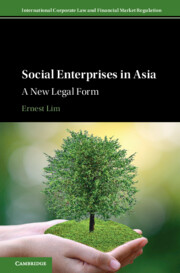Book contents
- Social Enterprises in Asia
- Reviews
- International Corporate Law and Financial Market Regulation
- Social Enterprises in Asia
- Copyright page
- Contents
- Tables
- Acknowledgements
- Table of Cases
- Table of Legislation and Regulations
- Abbreviations
- 1 Introduction and Overview
- 2 Corporate Purpose
- 3 Directors’ Duties
- 4 Decision-Making Powers
- 5 Reporting, Impact Measurement, and Certification
- 6 Distribution of Dividends, Assets, and Tax Benefits
- 7 Conclusion
- Appendix 1 List of 80 Social Enterprises
- Bibliography
- Index
6 - Distribution of Dividends, Assets, and Tax Benefits
Published online by Cambridge University Press: 12 March 2023
- Social Enterprises in Asia
- Reviews
- International Corporate Law and Financial Market Regulation
- Social Enterprises in Asia
- Copyright page
- Contents
- Tables
- Acknowledgements
- Table of Cases
- Table of Legislation and Regulations
- Abbreviations
- 1 Introduction and Overview
- 2 Corporate Purpose
- 3 Directors’ Duties
- 4 Decision-Making Powers
- 5 Reporting, Impact Measurement, and Certification
- 6 Distribution of Dividends, Assets, and Tax Benefits
- 7 Conclusion
- Appendix 1 List of 80 Social Enterprises
- Bibliography
- Index
Summary
This chapter critically examines the fifth and last criterion of the proposed framework for social enterprise law, namely, distribution of dividends and assets, and allocation of tax benefits. I assess how restrictions on the distribution of dividends and assets can ensure that the pursuit of social benefit is not subordinated to that of profit-making by analyzing the CIC regulations. I argue that these restrictions in themselves do not necessarily ensure that the pursuit of social benefit is prioritized over profit-making. Under my criterion, it is argued that directors should be required to issue a report specifying whether and how they have complied with the corporate purpose, among other requirements. In addition, they should be required to engage in a critically self-reflexive process on how they measure impact based on the proposed three-step framework. I also argue that because investors need to be incentivized to invest in social enterprises and given that a central challenge facing social enterprises in Asia is poor access to funding, I consider how tax law can be used to incentivize investments from shareholders.
- Type
- Chapter
- Information
- Social Enterprises in AsiaA New Legal Form, pp. 148 - 163Publisher: Cambridge University PressPrint publication year: 2023

